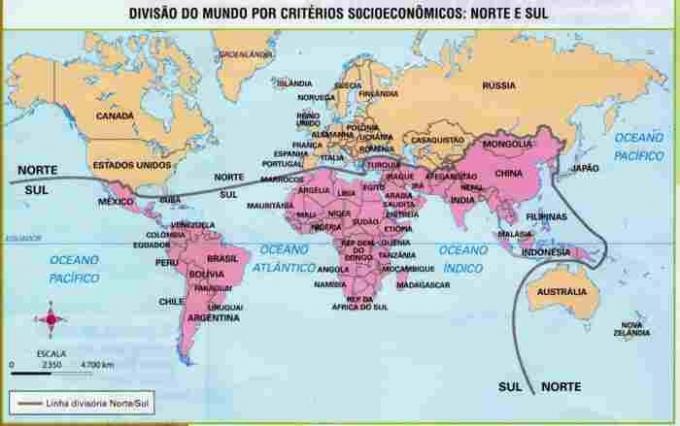In the scope of Geopolitics, a world order reflects the issues related to power in a given historical period. In this case, the New World Order reflects these global configurations today, and is therefore called the Current Geopolitical Order. In more precise terms, the New World Order refers to the international political scene in the period after the Cold War, which ended with the fall of the Berlin Wall and the end of the Union Soviet.
The previous period, marked by the duality between the United States and the Soviet Union in the so-called bipolarity, has been replaced by a new global geopolitical scenario. If, on the one hand, the Soviets declined, on the other hand, several other international powers emerged capable of confronting US power in the world. Among these actors, the European Union stands out – notably Germany –, Japan and its strong economic growth until the end of the 20th century, in addition to China, which emerged as the main country among the underdeveloped and emerging nations of the planet.
see more
Inequality: IBGE discloses the 10 worst states to…
Israel is the 4th strongest military power in the world; check the ranking
It is clear that, here, rivalry and political dispute are not established in the same way as in the War Cold, where there was direct opposition between two countries and the imminent risk of a third war worldwide. Now, the dispute takes place in the economic field, unlike in the past where the competition took place in the military field. Furthermore, these countries are not openly enemies, but different actors in the same scenario. international market, marked by the consolidation of the process of Globalization and Capitalism Financial/Informational.
ADVERTISING
Therefore, the term “bipolar world” was replaced by “multipolar world”, given the multiplication of international power fronts. Some authors, however, insist on the concept of a “unimultipolar world” because, on the one hand, we have the leadership of United States both in terms of economy and military power and, on the other hand, the proliferation of the protagonism of some powers financial.
An important feature of the New World Order is the expansion of the financial market which, if it was already very active before, is now able to quickly reproduce itself in the former socialist or “planned economy” countries, such as China, Vietnam and, more recently, Cuba. In terms of international prominence, only North Korea retains remnants of the previous world order, remaining under a closed and dictatorial regime, fueling a great rivalry with South Korea and the major capitalist countries today.
Another aspect of the current geopolitical period is the growing role played by emerging underdeveloped countries, with emphasis on Mexico, the Asian Tigers and, mainly, the so-called BRICS, an acronym formed by Brazil, Russia, China, India and South Africa. South. In addition to economic growth, BRICS members have been adopting a stance of misalignment political relationship with developed countries and seek to consolidate a kind of leadership among developed countries peripherals.
In recent times, Russia has adopted a posture that intensifies this misalignment. The country, which has a permanent seat on the UN Security Council, has been facing and challenging the United States in several strategic issues, such as the struggle for influence in Ukraine and also by vetoing US military intervention in the conflict of Syria. When Russia annexed the province of Crimea, located in the south of Ukraine, a scenario of deep diplomatic tension was established against the USA and, mainly, the European Union, raising the hypothesis, on the part of many political analysts, that the world would be entering a new Cold War.
In the economic context, one of the most substantial changes of the New World Order in the face of the bipolar world is the way of regionalizing countries according to their level of development. Before, it was customary to divide the planet into first, second and third-world, composed, respectively, of by developed capitalist countries, socialists and underdeveloped or non-aligned capitalists. Currently, world regionalization based on the north/south dichotomy is more common, with most countries northern countries as belonging to the developed world and southern countries in the world said “in development".
Look at the map below and notice that this division does not necessarily correspond to the cartographic principles of north and south.

One last aspect of New world order to be highlighted is the greater performance of the so-called groups terrorists. In fact, the origin of most of them took place during the Cold War, but their greatest power is taking place today, especially with the advances in technology, the internet and the ease these groups have in communicating, expressing their claims and spreading the word. fear.
When, in the early 2000s, then-US President George W. Bush, claimed that the United States was waging a "war on terror", he revealed the plot under which the New World Order was built. configured, since the “communist enemy” was replaced by diverse organizations, with leaders difficult to capture and with actions totally unpredictable. One of these actions was the attacks of September 11, mainly the impact of the planes that hit and brought down the World Trade Center, carried out by Al-Qaeda. Another terrorist group with a great impact is the Islamic State, which has had a large-scale presence and military control in the Middle East. In addition, Boko-Haram deserves mention, a radical Islamic group that has caused an uncountable number of deaths in the African continent, mainly in Nigeria.
The contemporary world, however, is difficult to diagnose in political terms, because at the same time that many socio-spatial analyzes are carried out, many others take place simultaneously. Therefore, it is important to always follow the information disseminated around the world, after all, in times of globalization and fragmentation of discourses, a great deal of change can occur in a short period of time. time.
By Rodolfo F. Alves Pena
Master in Geography
